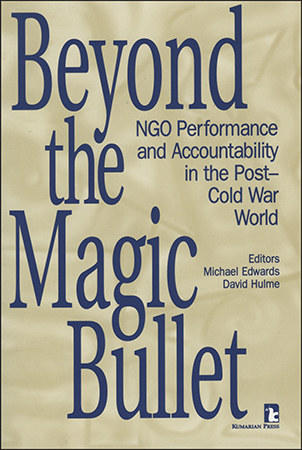Beyond the Magic Bullet offers a thorough assessment of the roles, performance, and accountability of NGOs and grassroots organizations in international development assistance. Drawing on case studies from Africa, Asia, and Latin America, the authors provide frameworks for assessing performance and accountability and offer experienced-based guidelines for improving both.
Michael Edwards is an independent writer and activist affiliated with the think-tank Demos, the global web magazines Open Democracy and Transformation, and the Brooks World Poverty Institute at Manchester University. David Hulme is professor of development studies and founder-director of the Chronic Poverty Research Centre and the Brooks World Poverty Institute, University of Manchester.
"This refreshingly candid analysis of NGO strengths and weaknesses is an essential read. It offers a powerful blend of intellectual analysis and practical field experience, and is of use to practitioners and academics alike."—John Clark, World Bank
"This is a book that will be widely used and cited by aid practitioners, government leaders, NGO managers, and development scholars for years to come."—Dennis A. Rondinelli, Duke University
"Illustrates the dilemmas and challenges NGOs are facing and offers ideas on the 'ways forward.'" —Thomas Carroll, George Washington University
"A rich array of practical and innovative ideas for enhancing NGO performance and accountability. The editors are to be congratulated for the unusually high quality of the individual contributions."—Julie Fisher, Yale University






